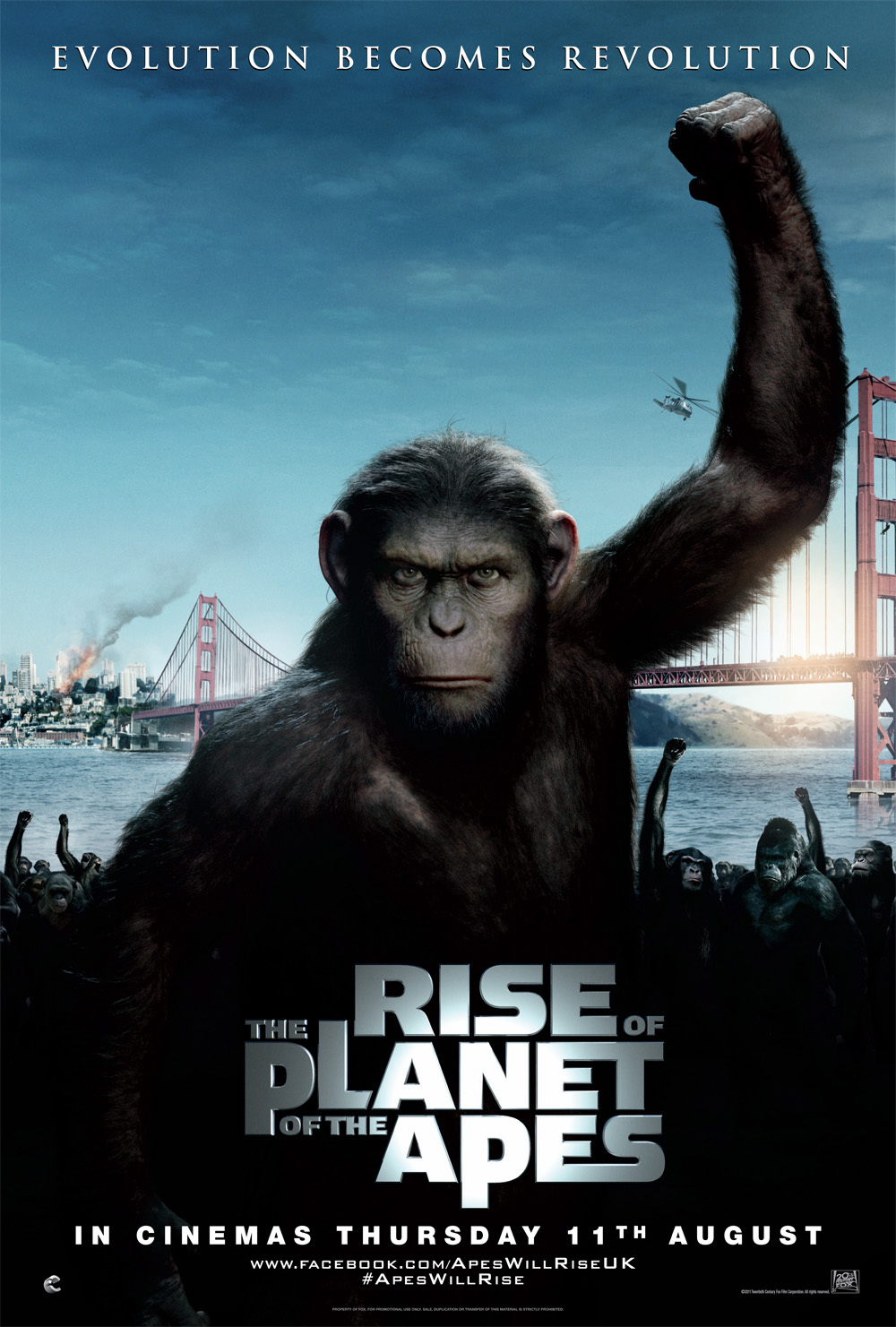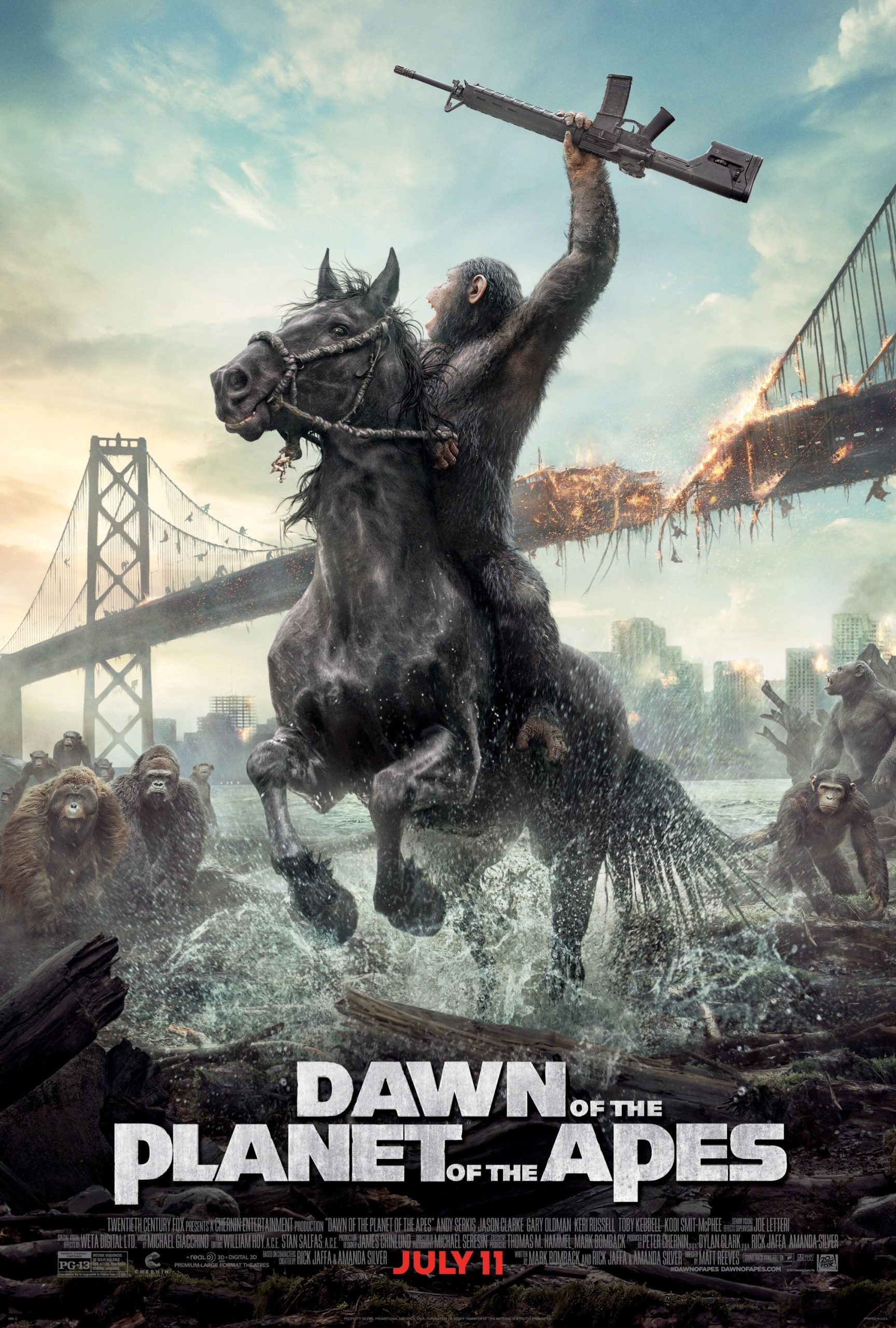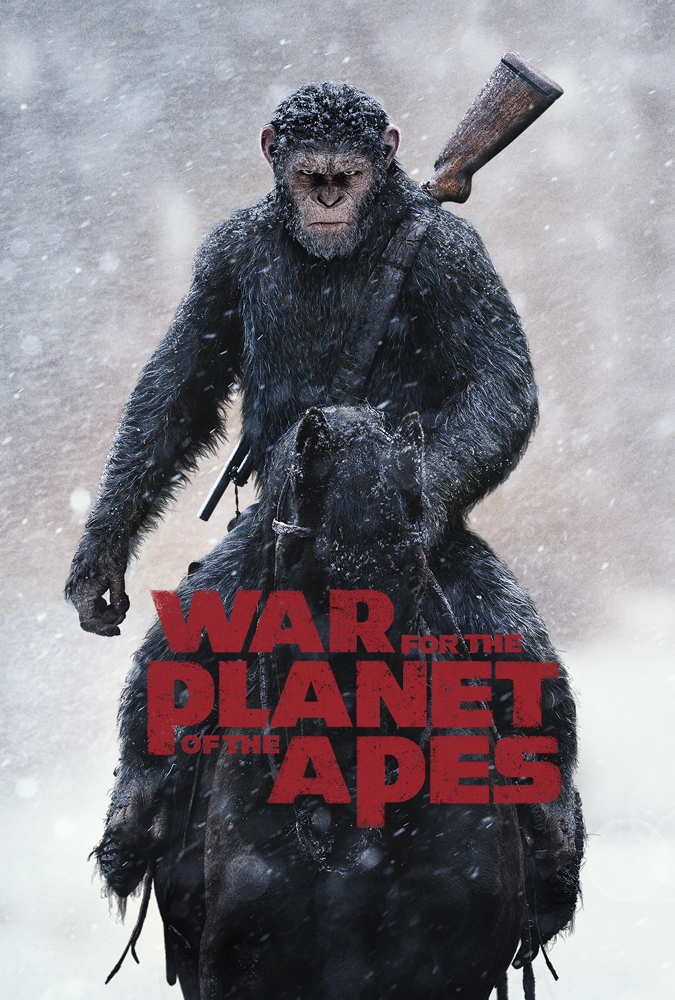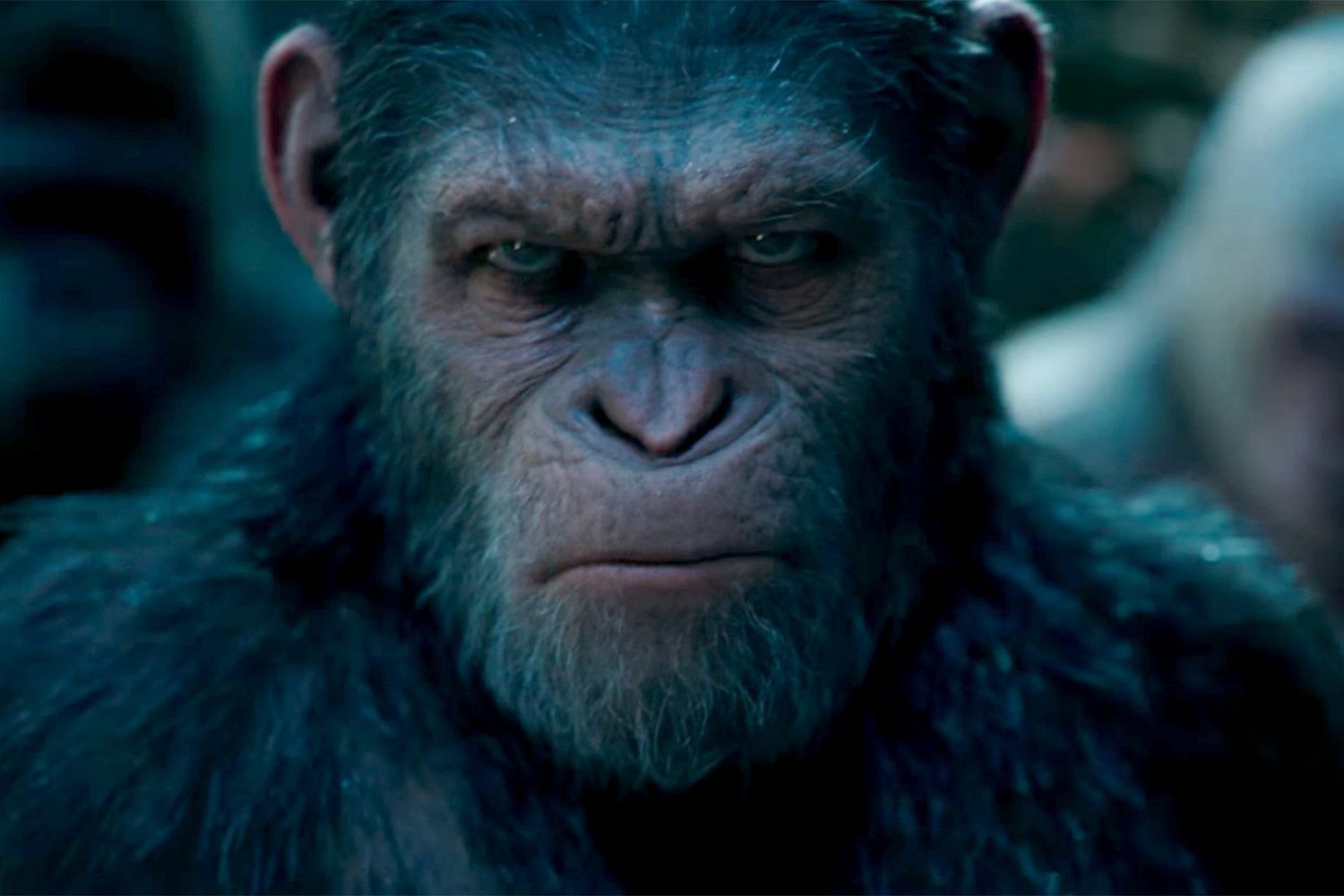Article by Chlo Hickson
Seven years ago one of the most underrated movie trilogies concluded with War for the Planet of the Apes, after watching the newest instalment of the franchise I decided to go back and watch Rise, Dawn and War to see if they hold up all these years later. I’m debating on writing a separate post about Caesar with Kingdom of the Planet of the Apes following his legacy, I’m on a Planet of the Apes kick at the moment.
As we’ve learnt from my previous reviews I could spend my time talking about the amazing special effects or the fantastic acting, but this time I want to dive deeper into Caesar’s story. How effective was it all these years later?
Rise of the Planet of the Apes
 Rise of the Planet of the Apes is a story about two things, identity and oppression. Almost every plot point ties into one of those two things. There are other themes but the reason I’m focusing on identity and oppression is because those are the themes that are explored through Caesar.
Rise of the Planet of the Apes is a story about two things, identity and oppression. Almost every plot point ties into one of those two things. There are other themes but the reason I’m focusing on identity and oppression is because those are the themes that are explored through Caesar.
The movie begins with a tragedy as we witness the murder of Bright Eyes, a mother who was trying to protect her son. After what is a major career set back Will begrudgingly takes in this new born ape until he knows what to do with him.
Will Rodman is honestly an underrated character in this trilogy because he could’ve just been this perfect father to Caesar, the human that is there to support Caesar no matter what but that isn’t the case. As Caesar grows up we see that Will is a caring and loving father to him but it’s important to note that his priority is to cure Alzheimer’s. The pain of losing his dad has driven him down this path. The reason I say Will isn’t the perfect father is because, if you think about it,deep down he only loves Caesar as long as he is useful in curing Alzheimer’s. He only takes an interest in Caesar when he discovers how smart he is. Will keeps Caesar around so he can monitor his growth with the effectiveness of the ALZ-112. I didn’t think of it like this until recently, when you properly examine his motivation does he love Caesar? He keeps him on a lead, keeps him in the house – only taking him out when he is told to.
Its this limited love that he has where Caesar struggles the most. The reason I say the movie is about identity is because it tries to answer the question who is Caesar? Caesar is raised to believe he is human, he wears clothes like one, even though he can’t talk he communicates to others like he’s human but most importantly he see’s Will as his actual father. Early in the movie Caesar wants to play outside with the other kids but because he does he gets attacked and is told to stay inside, later on when he see’s his “grandad” getting yelled at he protects him, but what happens when he does this? He gets thrown in animal prison.
Throughout the movie Caesar gives Will the submissive gesture because he trusts him, when he is scared to go inside the ape sanctuary he puts his trust in Will that everything will be ok but Will leaves him. He leaves Caesar to live in a cage, to be abused by the keepers and get bullied by the other apes.
How can Caesar be human if this is how his parent treats him?
In the first part of the movie Caesar often shows shame about being an ape, whenever he acts like a human everything is alright, but when he does act like an ape he gets in trouble. Who is Caesar if he is not human? The easy answer is to say he’s an ape, but the storytelling is more than that. Caesar’s identity crisis is an allegory for embracing who you are. In Rise Caesar was loved as long as he acted like something he wasn’t, he was even made to feel shame when he acted like his true self. Caesar is loyal, kind, and a strong leader. All qualities we see in humans but he is also an ape and he realises that after he meets other apes.
Shortly after the death of his father Will returns to Caesar and as Caesar notices he has a lead in his hand, metaphorically this is showing us that Caesar is refusing to go back to being someone he isn’t. Going back to being a pet but acting like a human.
After he is told to keep his paws off Dodge he yells no, Caesar is tired of being told what to do. Tired of being someone he isn’t, tired of taking orders from others like he’s a pet. This reborn Caesar will now rescue the other apes and bring them back to the promised land which is the forest. This is what is home to Caesar, this is where he belongs.
What can people learn from Caesar? You can learn that you shouldn’t compromise who you are to please others, you can learn that sometimes you can stand up for others like you who can’t stand up for themselves, you can also learn to not feel shame for who you are.
These are all lessons that Rise of the Planet of the Apes teaches us, but like I mentioned earlier, it doesn’t just focus on identity is also focuses on oppression.
For an ape Caesar has life pretty good. He has a loving parent, he an an attic to himself where he can play, when he’s injured there’s a vet that can treat him , he even gets to go to the forest every now and again. But lets look at it again.
Caesar has a loving father but is that love unconditional, no. If the ALZ-112 wasn’t passed down from his mum would he be loved? No. Caesar only gets to go to to forest when Will lets him, an ape can only go to the forest when he’s allowed too. Caesar has a home right? But what happens when he tries to leave that home? He gets punished. The window in the attic is a major symbol in this trilogy, something that lets Caesar look into the outside world, but narratively that window is a barrier. Both times he has passed that barrier he got in trouble. As he spends more time in the sanctuary he sees the more obvious sides of oppression, the abuse these ape receive, the feeling that these apes should be grateful for their climbing tree.
In the scene where the apes escape, the way the humans react, you’d think that the apes were attacking them. The apes are just trying to go to the forest, they are just trying to go to where apes are naturally from.
Oppression is where you have to fight and die just for the most basic rights, how many apes died just so the rest of the apes could live in the forest. When Caesar stands at the top of the tree at the end of the movie, that is freedom.
Caesar’s story in Rise is beautiful. We got to see someone not only fighting for their freedom, but someone discovering who they are and their place in the world.
Before I move on to the next movie I just want to talk about the end credits. The scene starts with the Simian Flu, something proven to be fatal to humans is being spread all over the world. Even though this version of The Planet of the Apes is fresh and new at the end of the day its still a re-telling.
The original Planet of the Apes films can be seen as a commentary on the cold war, racial conflicts, animal cruelty, oppression, religious conflicts etc
Rise obviously doesn’t touch on all of these themes but it does touch on a few, we can see the commentary on oppression and animal cruelty but nothing else.
When you think of Planet of the Apes one scene comes into your mind and that is the iconic statue of liberty scene. In this moment Taylor finds out that humanity doomed themselves. We were responsible for our own destruction.
The writers of Rise, Rick Jaffa & Amanda Silver, showed us their version with the Simian Flu being spread all over the world is a modern take on the statue of liberty scene. In the original Planet of the Apes and the 2011 version humans did it to ourselves.
Dawn of the Planet of the Apes
 Dawn is one of the best movies that I have ever seen. The character work in this movie is just brilliant. Rise needed to do a lot with its plot and it did it really well, Dawn doesn’t have a lot of plot to cover, the only thing that this movie needed to set up was a war between the humans and apes. That’s it.
Dawn is one of the best movies that I have ever seen. The character work in this movie is just brilliant. Rise needed to do a lot with its plot and it did it really well, Dawn doesn’t have a lot of plot to cover, the only thing that this movie needed to set up was a war between the humans and apes. That’s it.
When you think about war, there’s the good guys and the bad guys. Even in the first film they actually did this with the humans, the apes were good and the humans were mostly bad. So it would’ve been easy to set up a movie of good guys vs bad guys, but that’s not what happens.
Dawn spend so much time creating complex characters that even though the plot is humans vs apes, not all characters reflect that. There are four major characters in this film: Caesar, Malcom, Koba and Dreyfus. Koba and Dreyfus are the most committed to their cause while Caesar and Malcom are committed to their side but they value peace more than anything.
Koba and Dreyfus are motivated by trauma, ten years have passed since the first movie and since then nearly all of humanity has died, there are a few remaining survivors that are running low on fuel to survive. The apes live near the dam that can generate the power but they are very protective of their home.
There wouldn’t be a story if every character could just trust each other. At the end of the day the humans and apes don’t care about the other, they just want to survive but after what Dreyfus and Koba have been through can you blame them for their fears?
Koba is a character we got to know briefly in the first movie, for those that can’t remember he was that creepy looking ape with the scars all over his body. He was tormented, tested on and abused by humans. He has only known humans as these creatures that do nothing but inflict pain on others. This was until Caesar freed him, and now Koba has a family. He not only has people that he cares about but people that care for him. Now here comes some humans and what does Caesar do? Help them. To Koba it doesn’t matter that the humans are suffering, all he see’s is the odds of the humans re-inflicting the torture onto him are increasing because Caesar is helping them. Koba’s trauma runs so deep that there is no room for empathy. Its so strong that even if there is a small chance that the humans were going to attack first he couldn’t risk it. All his life Koba had no control, he was at the mercy of humans. So for the first time he isn’t leaving anything up to chance.
This is how you perfectly build a sequel. You take elements of the first movie and you build upon them in a natural way.
Can you blame Koba for his fears and trauma? I can’t. I can blame him for betraying Caesar and killing other apes but I can’t blame him for anything else.
On the other side we have Dreyfus, it’d be really easy for the writers to have a mirror image of Koba. Dreyfus isn’t motivated by the fear of the opposing side like Koba is, Dreyfus is motivated by the trauma of loss.
There’s a great scene where the humans get the power back and Dreyfus turns on his iPad to see pictures of people we assume he’s lost. His friends, his family, all gone. That brief moment of joy turns to pain as he is reminded about how much he has lost. It would’ve been so easy if Dreyfus, like Malcom and Ellie said ‘I’ve lost people too’, but seeing this reaction from him is a hell of a lot better than any words can convey. Dreyfus has got a second chance with a new family and a community of people to care for, and he isn’t going to loose them. At the end of the movie Dreyfus willing blows himself up and a few of his friends because he’s not going to let the people he cares about suffer.
Honestly, like with Koba, can I blame him? Can I blame someone who doesn’t want his friends and family to suffer again. No.
Dawn of the Planet of the Apes explores trauma through Koba and Dreyfus, it teaches us why people can go to extremes and what makes them that extreme. It teaches us why some people have no room for empathy, because trauma runs so deep that they can’t risk getting hurt again. Saying this I want to point out that not everyone who has had a traumatic experience turns out like Koba and Dreyfus.
Malcom is the opposite of Dreyfus, not just because he’s willing to trust the unknown and take a chance for a better future but because he cares about more than just surviving. Dreyfus wants to survive no matter the cost, Malcom wants to survive in a world of compassion, trust and belief in others. His first thought is always to resolve things peacefully. On multiple occasions he risks his life just to find peace.
Caesar’s arc in Dawn is something I find to be essential, especially in today’s day and age. We live in a world that is very divided, it is so easy to have an enemy. It doesn’t matter how that person ended up on that side, how they were convinced to be on that side, they are your enemy.
Look at Blue Eyes, he has probably never seen a human before the events of this movie but because of Koba’s influence he was led to hate humans. Its often the youth that suffers the most in these cases. Deep down Blue Eyes knew that this was wrong.
The movie has the apes and humans viewing each other as enemies, viewing the other side as worst than you are and as much as we love Caesar he is in this mindset at the start of the film. The conversation he has with Maurice in the beginning is very telling, they talk about humans and if they still think about them. Caesar says he often does but knows that humans destroyed each other, when Maurice brings up the fact that apes fight as well Caesar says that they are family and ape will never kill another ape.
To Caesar apes are better than humans because he believes that if the roles were reversed and the apes were fighting the virus, the apes wouldn’t turn on each other like humans did. He has seen both the good and the dark side to humans, a dark side apes don’t have. As the movie progresses Caesar is repeatedly tempted by Koba, he knows Koba is clouded by his emotions but it isn’t a serious concern because Koba would hurt another ape… Right? It’s the pain in Caesar’s face that always gets me, the realisation and shock that not just any ape, but someone that was there from the beginning turned on him and tried to kill him. During this whole movie he has been telling others that apes will never hurt another ape, but just like humans apes are capable of that same darkness.
Apes aren’t better than humans, they are the same. They face the same struggles and the same fears.
The movie might use two different species to convey its message but its perfectly clear, we’re the same. We’re all capable of violence. We’re all capable of love. We all suffer with trauma. We all fear our enemy. We are the same.
Dawn of the Planet of the Apes is a movie that touches on so many themes. Trauma, trust, compassion. This movie has so many lessons that people can learn from, especially in todays world.
War for the Planet of the Apes
 War for the Planet of the Apes was surprisingly personal, but we shouldn’t have been surprised. Rise of the Planet of the Apes was about the rise of Caesar, not about the apes exactly. Dawn of the Planet of the Apes was about how easy it was to paint others as our enemies. War for the Planet of the Apes isn’t about the war between the species, it’s about people that can’t come to terms with their pain.
War for the Planet of the Apes was surprisingly personal, but we shouldn’t have been surprised. Rise of the Planet of the Apes was about the rise of Caesar, not about the apes exactly. Dawn of the Planet of the Apes was about how easy it was to paint others as our enemies. War for the Planet of the Apes isn’t about the war between the species, it’s about people that can’t come to terms with their pain.
The movie begins and Caesar is exhausted. Years have passed since the previous movie and he’s still dealing with the consequences of Koba’s actions. Not only this but it turns out that other apes have been siding with the humans because they are so fearful of this Colonel. Caesar decides, in hopes of peace, to let the humans go. The humans thought Caesar was dead and doing this was a message that he only wants peace. However this decision would be very costly.
During a surprise attack he temporally leaves his family, only for him to come back to find his wife and son dead. It’s one thing to lose someone you love in war, its another to not be there to protect them in their final moments. There’s also nothing worse than someone taking advantage of your compassion.
War for the Planet of the Apes is simply a revenge story, we’ve seen plenty of them.
What makes this movie different is it was Caesar’s fault. It was his compassion that got his family killed. The reason this is important is because we need a good reason for the main character to lose themselves. In other revenge stories the characters often lose themselves just because they want revenge, in this movie Caesar loses who he was because who he was got his family killed.
When we get into the second act of the movie we can see that Caesar is consumed by vengeance. He abandons his son and his people so he can get revenge, but luckily a few apes come along with him. Maurice, Luca, Rocket and Bad Ape are there to represent a part of Caesar that he is losing. All of these apes are the way they are because of Caesar.
The highlight in this movie is Maurice’s relationship with Nova. When they enter the building, guns up, its Maurice that shows concern for the girl. It doesn’t matter that there are only downsides to bringing her along, Maurice can’t leave a child alone. This compassion is reflected by Nova later on when Caesar was dying in the cage. Another scene I want to point out is the scene where Nova is confused about herself, is she a human or an ape? She’s obviously a human but that’s not what Maurice focuses on. He tells her that she is Nova, she is her own person.
This is one of the major themes of the whole trilogy. We’re so focused on putting people into titles that we forget that everyone is an individual who has their own personality. Everyone is different. I love this. It shows that the writers get the themes of this franchise.
Luca isn’t present much in the trilogy but he gives his life for Caesar after a surprise attack, he was also a reflection of one of Caesar’s best qualities: Sacrifice. The same could be said for Rocket who was there all the way from the beginning, he took a rough beating and volunteered to get thrown into one of the cages just so Caesar could have some time to feel a little bit better.
Even after all this selflessness from his friends, Caesar can’t let go of his hate. The moment he realises all his people have been captured is devastating.
Not just because they were captured but also because Caesar, again, wasn’t there to protect them. It’s honestly insane what vengeance can do to you, you can be so hurt by something that you’ll end up repeating it anyway, Caesar felt like his biggest failure was not being there for his family. And again he wasn’t there for his family.
I’m just going to talk about the Colonel for a second. He isn’t in tho movie a lot but his story is powerful. The Colonel’s motivation is simple: He fears the end of humanity, not our extinction but everything that makes us human. Our history, religion, our ability to communicate. All this is on the line due to the Simian flu.
Caesar is consumed by vengeance against the Colonel but the Colonel is consumed by vengeance against this virus, he won’t let it win. It doesn’t matter what he has to do, has to kill, he won’t let this virus win. It isn’t just because of his pride of being a human, its because of what he’s lost.
We learn that his son got infected by this new strain of the virus and in order to stop it spreading he looked into his son’s eyes and shot him. According to the Colonel he didn’t kill his son the virus did and he wants revenge.
There’s definitely some similarities between Caesar and the Colonel, both lost their families to something and both will do whatever it takes to make sure that something doesn’t win. They’ll betray who they are and put others in harms way just so they beat their opponent.
However there is a difference.
The Colonel’s son didn’t die from the virus, he died because his dad killed him. I think the Colonel regrets this. He can’t afford this loose this war against the virus because he already killed his son because of it, to say humans can survive and thrive without their speech and intelligence is something he can’t accept. If he did he killed his son for nothing. The irony is the Colonel gets the virus because of the compassion of an infected little girl.
The ability to speak and have a higher level of intelligence isn’t what makes us special. What makes us special is the ability to love each other, to smile together, to be loyal to each other.
At the end of the movie Nova looks happier than ever. She can’t speak, but she’s happy.
The Colonel doesn’t want to be happy, he wants to be dominant and this is what leads to his downfall.
War for the Planet of the Apes isn’t about both sides being right. Its about how fear and pain can lead to an endless cycle of violence and death, and how even the best of us are vulnerable to this.
Throughout the movie Caesar is haunted by Koba, not so much because of what he did but because of who Koba was. Koba was someone who couldn’t escape their hatred and Caesar comes to accept that he is the same, but he isn’t. When he goes to kill the Colonel and finally get his vengeance he finds a man who wants to end his own life, who has lost everything. This is when Caesar comes back to himself, its not in his nature to heal himself through harm.
In Rise he didn’t want humans to get hurt, even when he let Koba kill Jacobs it was because he knew Koba needed to do it. In Dawn he kills Koba because he wants to protect his family, his people. In War he changed. He abandons his family and seeks vengeance so he can feel better.
He took pity on the Colonel in the end, and felt a very unexpected sympathy. Caesar has never been cruel so he doesn’t spare the Colonel because he doesn’t think killing is wrong, he doesn’t do it because he forgives him, he does it because he can’t bring himself to pull the trigger. It isn’t who he is. That’s what makes him an interesting character.
There’s an interesting connection between Caesar and Moses. I think you can see where I’m going with this. After everything he faced, all the pain and loss. He accomplished his dream and lead his family to safety, he lead them to the promised land but he couldn’t enter it himself. Having paid the price for his vengeance, even though he didn’t go through with it the damage had been done.
Whether you like this biblical tie is up to you, but I think at the end of the day War for the Planet of the Apes is my least favourite of the trilogy. This doesn’t make it a bad movie. Far from it. This movie teaches us a powerful message about vengeance, about pain and how it always leads to more violence.
Caesar’s story is beautiful and this trilogy is one of the most underrated movie trilogies ever!

